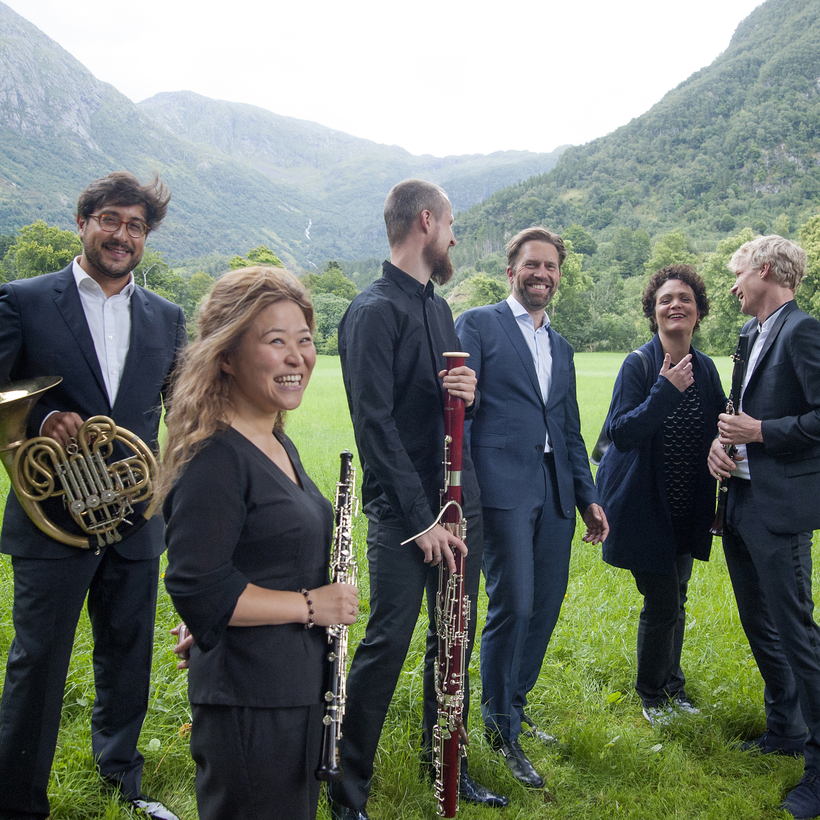The Barony Rosendal, nestled on the dramatic southern shore of the Hardangerfjord, bills itself as Scandinavia’s smallest castle. Two hours by ferry from the Hanseatic hub of Bergen, the foursquare manor house dates back to 1655. It bears scant architectural resemblance to the castles of one’s fantasies—but don’t discount the appeal of the library, with its French tapestries, preserved just as in the 17th century, or of the Renaissance rose garden, which has evolved with the changing taste of subsequent generations. For the globe-trotting classical pianist Leif Ove Andsnes, who was born on the nearby island of Karmøy and entered the conservatory in Bergen at 15, the barony is a magical place to make music, especially on the keyboard of one of its prize instruments, built in 1860 by the Parisian house of Pleyel.
Back when Andsnes first visited, the only rooms to play in were intimate living spaces seating perhaps 80 people—too small for most occasions. Of late, a barn on the property has been converted into a hall for as many as 500. Since 2016, Andsnes has been organizing the brief but blue-ribbon Rosendal Chamber Music Festival at the barony. This year’s edition, from July 7 to 10, presents a tribute to Beethoven originally planned for the snakebit summer of 2020, the year of the 250th anniversary of the composer’s birth. Along with Andsnes, some two dozen distinguished international soloists will be joining the festivities in constantly shifting constellations.

“When we talk about Beethoven we tend to focus on the grand, the struggle, the revolutionary,” Andsnes writes on the festival Web site. “Yet there is also so much tenderness, humor and ambiguity in his music.” The program explores these qualities in masterpieces and lesser-known repertoire from the full arc of Beethoven’s creative life. AIR MAIL recently tracked Andsnes down on the road in Germany, for a chat on Zoom.
MATTHEW GUREWITSCH: A while back you ran a top-notch chamber-music festival in the old port of Risør. I remember the town as very picturesque and very compact. From what I’ve seen, Rosendal is even more picturesque and more compact. Is that about right?
LEIF OVE ANDSNES: Rosendal is a village, really, with maybe 2,000 inhabitants. And with quite a different surrounding, inside the fjords. It’s a very mighty landscape, with impressive mountains around the English garden surrounding the barony, where it all takes place.
M.G.: Had you missed running a festival?
L.O.A.: When I left Risør in 2010, after 17 years, I decided that I’d had enough of that. But when the people at the barony wanted to convert the old barn where they used to keep the sheep, they asked if I could consult a bit on the acoustics. I got a specialist involved, and the hall turned out beautifully. Then they asked if I could create a kind of festival there, and I did feel the urge to make programs again. Being a curator is part of my being as a musician.
M.G.: You had a co-director in Risør, but now you’re on your own.
L.O.A.: Being on my own makes the work a little lonely sometimes, but, on the other hand, I get decisions a lot faster.

M.G.: When you invite artists, do you already have repertoire in mind for them?
L.O.A.: It’s a give-and-take. I have my ideas, but sometimes they come back with counter-proposals.
M.G.: How about choosing who plays with whom? Apart from the string quartet, all these artists have solo careers. Do you try to match up people who want to play together?
L.O.A.: They may want to play together and not know it yet!
M.G.: Let’s talk about Beethoven. Ten years ago, with the Mahler Chamber Orchestra, you launched a project called the Beethoven Journey, dedicated to the five piano concertos. You conducted from the keyboard. The reviews from the tour and for the recordings were phenomenal. What may have impressed people most was the interpretive spontaneity. But other than that, you really haven’t been much associated with Beethoven, have you? You’re not one of those pianists who does cycles of the 32 piano sonatas, for instance, or makes a specialty of the Diabelli Variations.
L.O.A.: I’ve played about half of the sonatas, but all spread out. With the Beethoven Journey, I basically spent four years playing Beethoven—partly because I felt that he hadn’t had enough of my attention. Something was missing. I felt I needed some time only with him.
M.G.: Beethoven’s catalogue, like his biography, is so full of drama and surprises. The piano concertos cover a comparatively concentrated period—from around 1790 to 1811, before he lost his hearing, which was such an important turning point. What, for you, was the great discovery of the Beethoven Journey?
L.O.A.: When I started, I thought Beethoven was all about the heroic struggle with form and structure. By the end, I felt that Beethoven is about freedom. Until I played the concertos together, I thought the Third and the Fifth were very much alike with their military rhythms and their military character. Playing them side by side, I felt that they’re totally different. The music of the Third is full of short phrases, like questions and answers all the time—and more questions than answers. But when you get to the Fifth, right away you feel liberation and ecstasy! We are there! That was new to me.
The Rosendal Chamber Music Festival is on at the Barony Rosendal from July 7 through July 10
Matthew Gurewitsch writes about opera and classical music for AIR MAIL. He lives in Hawaii


 Discover
Discover